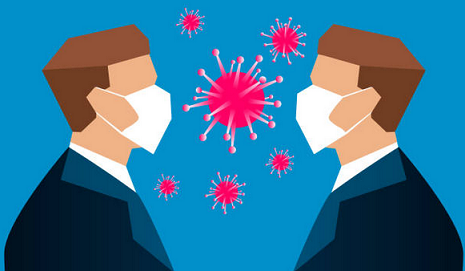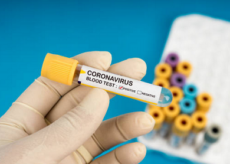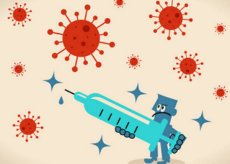6 Ways to Strengthen Immune System to Prevent Coronavirus Infection
- March 1, 2020
- in Coronavirus

Coronavirus that causes a disease called COVID-19, originated in China in Dec 2019 and has spread across whole world beginning of 2020. The virus comes from a family of viruses that was discovered way back in the 1960s. The coronavirus gets its name from the way it looks, similar to a crown. But it’s origin is still unknown. Their different types cause a variety of illnesses, from simple cold to severe respiratory syndrome (a severe form of pneumonia).
Now coming back to the recent havoc the virus has created globally starting 2020, patients can only be treated with existing antiviral drugs of limited effectiveness and other drugs that combat the symptoms (fever, inflammation, pain).
Without a test in the laboratory, an infection cannot be reliably diagnosed. At first, the infection may feel like a common cold with cough and fever. In severe cases, infected person may develop pneumonia and in some cases shortness of breath may be observed. The incubation period of new corona viruses is between two and 14 days.
Influenza viruses, on the other hand, usually make person very ill suddenly, with fever and aching limbs one or two days after infection.
Strengthen Immunity – Most Important Key to Fight Virus
Strengthening the immune system and using natural remedies having antiviral properties can be an effective strategy to prevent a possible infection and fight the virus (but none of these guarantees that you won’t get infected by the Coronavirus). In case of Coronavirus, preventing yourself as much as possible is the only key, at this point, since there are no drugs developed yet to kill this virus.
The victims are most likely the older people with a chronic illness or respiratory problem. But healthy people with a strong immune system have a better power to avoid this virus infection.
You can boost the immune system by following 6 simple solutions:
- Physical exercise
- Dietary changes
- Preventing measures
- Sufficient sleep
- Reduce stress level
- Drink plenty of water and reduce alcohol consumption
(1) Physical Exercise
The best preventive measure against any infection is a healthy and active immune system. Boosting of immune system to prevent coronavirus is possible by exercising regularly, for 30 to 40 minutes a day, three or four times a week.
Physical activity strengthens immunity, improves circulation, and reduces inflammation. If there is no disease that contraindicates it, the minimum dose of exercise, even for older people, is 30 minutes, three days a week.
(2) Diet – Best Foods for Improving Immunity
A diet based on whole and natural products, allows the proper functioning of the body’s defensive systems. Is also important, since the foods you eat and drink play a key role in immune function.
Fruits and vegetables contain phytonutrients, antioxidants, fiber, oils and acids that will keep you and your immune system happy and healthy. Eat plenty and try to include as many different colors as you can, to ensure you benefit from the full range of bioactive compounds they contain.
There are 8 easily available foods/plants with antiviral properties to strengthen your immunity.
(i) Elderberries: Are one of the great antiviral remedies in European natural medicine, traditionally used to treat cold and flu. It’s supplements relieve upper respiratory symptoms caused by viral infections.
(ii) Sage: Is an aromatic plant that has been traditionally used to treat viral infections. The anti-viral properties of sage are mainly attributed to compounds called safficinolides, which are found in the leaves and stem of the plant. You can make an infusion with 15 g of dried leaves per litre of water.
(iii) Sacred Basil or Tulsi: Boosts immunity, which can help fight viral infections. Sacred basil extract significantly protects and defends your body from viral infections according to the article published in U.S. National Institutes of Health’s National Library of Medicine (NIH/NLM).
(iv) Fennel: Is a sweet-tasting plant that can fight certain viruses because of transanetol compound present in it. The leaves and flowers are consumed fresh, which can be chopped and added to salads and sauces. With a teaspoon of dry seeds (5 g) you can prepare an infusion for 10 minutes. It is not recommended for children or pregnant women.
(v) Garlic: Is an anti-viral food par excellence. Its effectiveness against viruses has been been published in NIH/NLM. It should be eaten raw to take advantage of its qualities. If you are going to cook it, chop it half an hour before, so that its active principles and enzymes remain intact and retains many of its properties after cooking.
(vi) Echinacea: Is one of the most widely used plants in phytotherapy to stimulate immunity. Although you can take the flowers or the root, the most advisable is to resort to tablets and tinctures with standardized content.
(vii) Licorice: Is one of the most recommended natural cure for fighting flu and pneumonia viruses. Some studies found that, in test tubes, its active ingredients were capable of tackling the SARS virus, which is similar to and more serious than the Wuhan coronavirus. This plant is part of the traditional Chinese formula that proved effective in preventing SARS infection, according to a report published by the WHO.
To prepare the infusion, cut a stick of root into very thin slices, put a teaspoon of them in boiling water and keep them in decoction for a couple of minutes, then turn off the fire and wait 10 minutes before straining the water.
(viii) Ginger: This home remedy has impressive anti-inflammatory and anti-viral properties because of the concentration of two compounds such as gingerols and zingerone, which inhibit the replication of viruses and penetrate healthy cells. You can take dry extract tablets or prepare an infusion with fresh ginger slices.
(3) Preventive Measures against Coronavirus
(i) Wash your hands: When you are unwell, unpleasant germs and pathogens that made you, will typically hide in your hands, nails, and between your fingers. That’s why you should always wash your hands using alcohol based hand sanitizer after using the bathroom, sneezing, coughing, touching animals and most importantly before eating.
How to wash hands properly?
Be thorough while washing your hands. You should thoroughly clean areas between your fingers, behind palm and under nails and rub for at least 20 seconds, rinse and dry thoroughly.
(ii) Use hand sanitizer: It’s best to clean your hands whenever possible. In situations where you don’t have access to soap and water, use an alcohol-based hand sanitizer that has at least 60% alcohol. Always carry a small bottle, so you can use it at any time.
(iii) Don’t touch your face with your dirty hands: Viruses can enter body through your eyes, nose, mouth and other orifices. Putting dirty, contaminated hands on your face can cause an infection. Try not to give germs any chance to enter your body.
(iv) Avoid close contact with sick people: It is obvious that someone who has an infection should stay away from close contact with others to avoid spreading the virus. Get rid of the hugs, kisses, and handshakes. If someone coughs and sneezes, walk away and explain that you don’t want to get sick. Likewise, if you feel sick, you should stay home and keep your friends and colleagues safe from whatever you have. You should also stay away from crowded places.
(v) Wear a surgical mask: Studies show that wearing a mask to protect against epidemics or respiratory disease may offer some protection, but only in certain circumstances. But best of all, whenever you go outside, try to wear one.
Because as the saying goes: better to prevent, than to cure. Remember to wear surgical mask and not regular ones, since surgical masks used by doctors are designed to prevent smallest of viruses entering the body. Whereas normal masks can only prevent large dust particles.
(vi) Cover your mouth when you cough or sneeze: When you cough and sneeze, the tiny droplets, filled with thousands of viruses and bacteria, travel at about 100 miles per hour. They can land on surfaces, on other people, and even remain suspended in the air for long periods. As you can imagine, this is an effective way to spread infection.
If possible, try coughing or sneezing into the bend of your elbow to help keep the droplets from escaping into the atmosphere. If you can’t do this, use a tissue to cover your mouth, but using your hand works if there is no other alternative. If you use a tissue, always throw it in the trash or toilet immediately and don’t forget to wash your hands afterwards.
(vii) Clean and disinfect objects and surfaces: Use bleach or disinfectant to clean kitchen and bathroom surfaces, telephone, door handles, and children’s toys. Once you realize how easily sneezes spread germs, you can see the importance of this step. Try to keep the bathroom and kitchen particularly clean and sanitized.
(4) Combat Stress:
It’s no secret that any kind of stress is bad for your health and can make you more susceptible to viral infections. Especially chronic stress increases the chance of developing an infection after exposure to a pathogens.
So use yoga and relaxation techniques such as meditation or deep breathing to calm your mind.
(5) Drink plenty of water and limit alcohol consumption:
It’s best to keep yourself hydrated by drinking plenty of water preferably warm water. Hydrated cells are better at fighting infections and removing toxins, germs and pollutants from the body.
(6) Get enough sleep:
Have you ever been sick and spent all day sleeping? Sleep helps your body recover, reduces stress and is an essential survival mechanism, to repair and heal. Make sure you get enough sleep, at least eight hours.
If you feel sick, you should allow yourself to get all the sleep your body needs. It will also help you keep your body strong and avoid injury. A good night’s rest with sufficient quality sleep is essential to maintain the number and activity of the immune cells that detect and eliminate viruses before they become a problem.
Important Note:
Even simple colds are spreading. Anyone who feels ill should contact their family doctor – initially by telephone and do not visit directly. Because if you have any of the symptoms of coronavirus, it may spread to others and even doctor.
Author: Nilam

This article has been written by Nilam Mehta and she is one of the owner of this site/blog.
Nilam has worked in Pharmaceutical industry and have studied – Lifestyle Medicine from Doane University; Science of Exercise from University of Colorado Boulder. She believes that many of health problems can be cured naturally.
You can reach her on [email protected]



